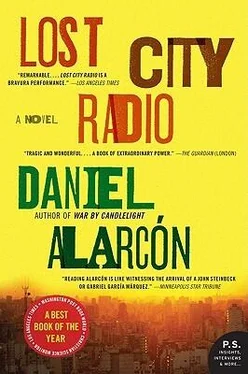Manau nodded at his landlord, at the gathered men, and felt tolerated. Nothing builds community like complaining. He looked Zahir in the eye and knew there was something he should tell him. What if Nico were to leave? Victor had spoken of it as a child would: without nuance, certain of right and wrong. “He doesn’t care if his family starves without him,” Victor said of his friend, horrified. Manau didn’t see it so clearly: what a place this is to grow into adulthood! No one would starve — even Zahir must know that! Of course, the boy wanted to leave. He was the oldest boy in the school by nearly two years. He had celebrated his fourteenth birthday a few months before, on a dismal, rainy day, surrounded by children who barely reached his shoulders. All the boys his age had gone off to the city. Let them, Manau thought. Let Nico go, too. It struck Manau as comic: the slow disappearance of the place, the boarded-up houses all along the streets off the muddy plaza. Padlocked, shuttered, rotting inside. Their owners don’t visit, they don’t send money. It won’t be long now; soon they’ll stop pretending, pack up en masse, and close the town for good. They’ll say a prayer, turn their backs on this place, and let the jungle surround it, colonize it, disassemble it.
After the mothers came to scatter their children, a few parents had come to Manau to complain: How is it that you let them go? Why on this day? The mothers were desperate that their children stay, because mothers are the same everywhere. What if they leave us? Manau’s mother had been worried for her child as well, had stayed up with him the night he listened nervously for his score on the radio. She had wept when it was announced; she knew what it meant. Where will they send you? she’d asked. Now here he was. Manau had felt for a while the unreality of his own actions. Nothing had the weight, the shape, or the color of real life: it was what allowed him to observe his naked, degraded body with amused detachment; to imagine, with eyes closed, Adela loving him on the creaking wooden slats of her raised hut near the river. It was what allowed him to glare now at the captain across the fetid, smoky canteen, without fear, certain that no matter what he might say or do, the town’s demoralized men would back him up. He hummed along to the radio, felt the distant beating of his own heart, and smiled to himself.
Outside, Victor, Nico, and a few other boys stood on plastic crates, looking through the window at the canteen. Nico’s sister, Joanna, was there, with a friend, teasing the boys. “Monkeys,” the girls pronounced. “No minds of your own.” The boys shrugged off the charge. Nico had been at it all day, stalking the soldiers around town, even following a few who went off into the jungle on a reconnaissance exercise. He returned, not a little disappointed, and told Victor that they hadn’t fired their guns.
“Not even once,” he said.
The canteen was bursting with noise and life. It was such an odd sight: these fifteen strangers, and in the background, a few of the regulars nearly hidden behind a curtain of smoke. Someone sang tunelessly, the melody soon eclipsed by whistles and laughter. Victor stood on his tiptoes to take it all in. Was that his teacher there, now turned away, now smirking toward the soldiers? The captain who had smiled at Victor’s mother sat in the center of a circle of soldiers, their eyes glistening with reverence. He told war stories that contained no corpses, no dead: only long stretches of marching with guns at the ready. “Nothing to shoot at. Just walking. Enough to wear out two pairs of boots. Enough to rot your feet.”
“You never found a battle?”
“The jungle is endless,” he said. “We called our squadron leader Moses. We were the wandering tribe.”
Victor strained to see. Nico, by contrast, could rest his elbows on the ledge. Still, Victor could hear all of it, and now he looked at his friend, unimpressed by these mundane accounts of the soldiering life. “ That’s what you want to do?” he asked. “Walk around?”
Nico shrugged. “What do you know about anything?” he said. “There’s no war anyway.”
“It sounds stupid.”
“You sound stupid,” Nico snapped. “At least they go places.”
Victor punched him in the arm, and his friend tumbled off his crate. He hadn’t meant to do it. The other boys stepped back, hushed.
Nico stood up. One of the younger boys started to wipe the dirt off his back, but Nico slapped his hand away. He was smiling. “An accident, huh?” Nico said.
“Yeah.”
“You’re good at those, aren’t you?”
Victor didn’t speak. He didn’t breathe.
“Say you’re sorry.”
“I’m sorry,” Victor muttered. He held his hand out, then felt Nico’s open palms shove his chest. He fell back, his head bumping hard against the wall. He heard a gasp. He was sure that one of the girls screamed. It was dark, then light. Victor gasped for air. He blinked: Nico was over him, along with a dozen others. There were haloes of light around all these young, familiar faces.
“You can’t tell anyone.”
“He’s fine.”
“You killed him…”
Once, climbing trees over the river, Victor and Nico had seen a helicopter skirting the treetops downstream, bobbing unsteadily in the sky. A vision from a long-ago windy day. They had climbed the tree hurriedly, nearly falling twice, to get a better look at it. Transfixed by its motion, Victor wondered where it would land, where it was headed. He hadn’t considered for a moment that the machine held people inside; to him, it was shiny and steel and alive of its own accord. It was male and female, a being unto itself. He saw its past and its future. It lived on a mountain top overlooking the city. It had blood inside and a beating heart. And then, just before it faded from view, the helicopter caught the sun’s reflection: an explosion of silver light, like a star against the bright morning sky. The distant whirring trailed off, but for minutes after, Victor blinked and could still see the helicopter’s glow etched in red, burning against the black insides of his eyelids.
It was only when he dived into the cool river that the last traces of the moment had passed.
Strange, Victor thought, that they were even friends.
Noise, shouting; his peers forming a wall around him. Nico crouched by his side. “I’m sorry, Vic,” he said. “Are you okay?” Victor felt himself nod. One of the girls ran her fingers through his hair, and he felt he loved her.
AT THE bar, the men of the town listened with their backs to the soldiers. War stories. Manau noticed his landlord had dropped his head down into his chest, as if he were trying to see into the workings of his heart. It was his turn to drink, and he was taking his time. Another man was rubbing his back, and it was a long moment before Manau’s landlord looked up. He was squinting. “I don’t like this talk,” he said. He lifted his glass between his two stumps, effortlessly, raised it to his lips, and drank. Not a drop was spilled. He passed the glass to Manau.
What elegance, Manau thought. He emptied the foam on the floor, nodded to his landlord. The soldiers were boisterous and happy, and Manau was sure he hated them. They would come and go, they would forget. He would stay. We will stay, Manau thought, and that pronoun crackled in his brain. In the local dialect, there were two kinds of we: we that included you , and another, which did not. Barely anyone spoke that language anymore — a few of the ancient women of the village, and no one else. But some of the old words had slipped into the national language, including these. We that includes you was one of Manau’s favorite words. On this evening, as he watched his landlord raise a glass and lament the distant war, he felt something like kinship. It was the drink. It was the heat blurring everything into a gauzy half-light. The soldiers were unrepentant strangers, the captain a morbid comedian, but Manau belonged.
Читать дальше












